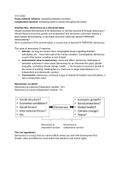01/11/2022
Cross-national variance: comparing between countries
Longitudinal variance: comparing within a country throughout its history
Amartya Sen - Democracy as a Universal Value
Should countries first become fit for democracy, or will they become fit through democracy?
Should there be economic growth and employment first (economic outcomes) already in
place before democratizing, or are these economic outcomes gained THROUGH
democratizing?
He is a proponent of the second option, a country has to become fit THROUGH democracy.
The value of democracy (3 reasons):
1. Intrinsic: as long as humans have congregated issues regarding freedom,
self-dignity, etc… have been part of the human condition. Consequently, democracy
is part of the human condition in and of itself.
2. Instrumental value to democracy: cause and effect, democracy itself leads to
desirable outcomes in other areas (democracy as an instrument for good, growth,
inequality, combating climate change, health…). He focuses on economic growth in
the sense of avoiding catastrophes (i.e. there are no large scale famines in an
independent and democratic country)
3. Constructive: democracy constructs a type of interest formulation and articulation, it
has a constructive value.
Democracy: so what?
Democracy as outcome (Dependent variable - DV)
Democracy as cause (Independent variable - IV)
The Lee hypothesis
Democracy is a luxury that you cannot afford unless you start with development first
Growth, Jobs and Affluence come before free elections and human rights
,03/11/2022
What is democracy?
Democracy as mob rule
Originally democracy was viewed with contempt. It was considered a perverted and
corrupted form of government - the common people and their cognitive abilities were seen
extremely negatively -> Elitist line of tradition
Western conceptions originated as limiting the power of the people to preserve as much as
possible the common good.
Ancient Greece: demos kratos
Classic philosophers were not for democracy
- Plato’s ship of state metaphor: extreme form of technocracy, “to save democracy
you need to save it from the people”. Leave governance to people who know what
they are talking about
- Aristotle: classification and typologies of regimes. Democracy was a corrupted form
of governance of the many
Mob rule, where the many govern but without any care for the common good.
Classifying definitions
Maximalist/Substantive view of democracy: political regimes are classified in regard to
the outcomes that they produce.
However:
- Too many attributes means no empirical referents
- Too many attributes means limited analytical use (I.e. tautologies, nothing can be
used as a independent or dependent variable anymore if everything is part of the
definition*)
*Tautology: circular line of reasoning if cause and effect are measured on the same spectrum
Minimalist/Procedural view of democracy: political regimes are classified in regard to their
institutions and procedures.
However:
- Too few attributes -> all cases become instances (i.e. elections: in brutal autocracies
elections are actually very common. A definition that is too small is no use)
, + Easily devolves into a maximalist definition: what is free and fair in a free and
fair election requirement? Does income inequality count? On paper they all
participate equally, but circumstances behind said vote are constraining and
they are not actually free to decide in the same way.
Is democracy a dichotomous or continuous variable?
Continuous: two ideal types that you can place inbetween
Dichotomous: either a democracy or not, no shades of gray.
Building democracy indices (democracy index)
Background concept: broad constellations of meaning needs to be specified further
CONCEPTUALIZATION
Systematized concept: specific formulation of a concept, i.e. an explicit definition
OPERATIONALIZATION
Indicators: how do you measure it? Need of observable, quantifiable characteristics. An
indicator is this measurable characteristic.
CODING
Scores: the actual numbers
AGGREGATION
Final index: giving weight to scored indicators, bringing all measured indicators together and
giving them the weight they need to have in your score for your definition. These choices
need to be justified (i.e. if we say turnout and contestation freedom are equally weighted it
needs to be justified). Transparency is crucial in the way indices are constructed.
Polyarchy - Robert Dahl
Most commonly used measure in comparative politics is derived from the polyarchy concept
from dahl.
, “Polyarchy” is based on two pillars (which can be extended)
- Contestation: Contest between rival elites for office
- Inclusion: Broad participation by the citizens
Polyarchy and not democracy because democracy was considered an unattainable ideal for
him, thus not supposed to be used for these measurements, because it is utopian.
Institutional and procedural requisites
1. Elected officials
a. The important offices that decide law, budget and policies need to be elected
2. Free, fair and frequent elections
a. Absent from intimidation, repression. Citizens are free to vote for whoever
they want. Anonymous voting is crucial in this instance. Fair means that
citizens and parties have an equal say in the process: votes count the same
and people are able to get informed and parties have a level playing field
against one another. Frequent means more than once a generation. There
are clear rules about who gets to poll elections and under which
circumstances.
3. Freedom of expression (including press freedom)
a. Freedom from interference by the government in forms of expression
4. Associational autonomy
a. Freedom to form political parties, movements, civil society and elsewhere and
organize.
5. Inclusive citizenship
a. Often the last one to be implemented, as often these previous criteria are
exclusive to property owning white men. Late in the 20th century is when
most western democracies expanded/extended this right to the larger part of
the population. This right is easy to guarantee of paper but practically it is
very much under attack through voter manipulation and suppression
All these factors together are often also called ‘electoral democracy’, to distinguish it from
“liberal democracies”, which also include rule of law, constitutionalism and constraints on the
executive. There is a lot of backsliding both in the electoral aspect and individual rights being






